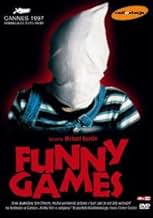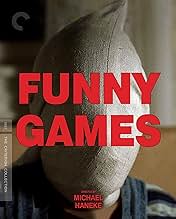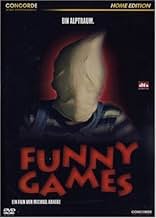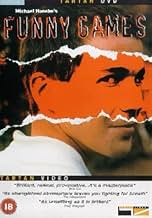Funny Games
Two violent young men take a mother, father, and son hostage in their vacation cabin and force them to play sadistic "games" with one another for their own amusement.Two violent young men take a mother, father, and son hostage in their vacation cabin and force them to play sadistic "games" with one another for their own amusement.Two violent young men take a mother, father, and son hostage in their vacation cabin and force them to play sadistic "games" with one another for their own amusement.
- Awards
- 5 wins & 9 nominations total
- Director
- Writer
- All cast & crew
- Production, box office & more at IMDbPro
Featured reviews
I don't know what to rate this. Although I can appreciate what Haneke was going for, the morally condescending tone didn't work for me. While you could write a book on the topic, I'll keep my thoughts short: humans have a fundamental craving for violence, and I can differentiate violence in media from violence in reality. His message just ended up falling flat. There wasn't any deeper criticism of violence and I didn't walk away feeling wrong or like I should have a new perspective on the matter. Yet I still didn't dislike it... The film was expertly crafted for his intentions, was adeptly acted, and I was kept engaged. Does that make me his target? Is it just pretentiousness? I'm not sure.
6.4/10
6.4/10
First things first, Michael Haneke HATES Quentin Tarantino's films. He hates the way violence and death are shown as being 'cool' - Cool gangsters executing their enemies whilst saying cool lines (And you will know, that my name is the Lord! etc,etc)with a cool song playing in the background. This is not how violence is in the real world, violence is a horrible fact of life, not a glamourous thing for youths to copy, and I think Haneke intended Funny Games to show it how it really is. I watched Funny Games without the slightest clue what the film was about, so I just had to sit back and take it as it comes. At first, I wasn't too impressed. I thought the scenes were too long and dragged out, yet at the same time, I felt a strange feeling of suspense. The incredibly long camera shots leave you that bored, that you think "Something bad is going to happen soon, I can tell...". The suspense also lasts right through the film 'til the very end. You don't want to watch it, but at the same time, you feel hypnotised by it.
I will not detail any events of the film, to save spoiling the atmosphere, but I will note one thing that people tend to be confused about:- "Why did the family let them into the house in the first place?" The two characters of Peter and Paul are let to walk all over the family because of one flaw in the bourgios psyche - 'The more polite a person is, the better a person they are.' This absurd way of thinking is played on by Peter and Paul and they obviously score, plus 'getting into the house without breaking in' is also one of their 'games'.For those who haven't seen the film, I definitely wouldn't recommend this for a night in with the parents/girlfriend, but I definitely would for people who want to see the difference between death and Tarantino-glam. Prepare for a highly suspenseful yet sickeningly violent, non-Hollywood, edge-of-the-seat piece of art. 8/10
I will not detail any events of the film, to save spoiling the atmosphere, but I will note one thing that people tend to be confused about:- "Why did the family let them into the house in the first place?" The two characters of Peter and Paul are let to walk all over the family because of one flaw in the bourgios psyche - 'The more polite a person is, the better a person they are.' This absurd way of thinking is played on by Peter and Paul and they obviously score, plus 'getting into the house without breaking in' is also one of their 'games'.For those who haven't seen the film, I definitely wouldn't recommend this for a night in with the parents/girlfriend, but I definitely would for people who want to see the difference between death and Tarantino-glam. Prepare for a highly suspenseful yet sickeningly violent, non-Hollywood, edge-of-the-seat piece of art. 8/10
I saw this movie again last night, for the third time, and once again had to keep watching each torturous minute until its chilling end. Going through the comments index, I see the expected responses: it was boring: it was pointless: it was too long: it's a satire: the games aren't actually that funny: it involved the audience in a neato way: it's nothing new: it's been done before. So I here offer an interpretation to add to the cacophany of reactions that FUNNY GAMES seem to engender.
What this movie reminds me of is the Book of Job, in the Bible, where God and Satan decide for their own amusement to torture this guy Job, killing his family, racking him with boils, and various other divine amusements. While watching this movie last night, I thought of another reference, this time from "King Lear": "Like flies to wanton schoolboys are we to the gods;/ They kill us for their sport." What this movie does is challenge the audience's own involvement in visual narrative -- usually, we watch movies from somewhere on-high and omniscient; we're invisible but we see all; we're voyeurs, just like God. In Haneke's film, we identify not with the victims but with the all-powerful killers as they set about their funny games. The two polite young men are performing their entertainments for us, the viewers; they're slaking our bloodthirst, our desire for gory spectacle - - after all, isn't this why we watch movies like this in the first place? Haneke, however, doesn't play the usual evasions; he makes explicit the audience's participation in violence; and he forces upon us the need to take responsibility for it.
I find this fascinating. I also find the negative comments here fascinating as well -- "not violent enough!" "the victims deserve to die..." "all the violence is off-screen..." "no gore at all, 'LAST HOUSE ON THE LEFT' did it first, with more blood...." etc. as being inadvertantly revealing of those viewers' psyche. I especially love the comment made by that one Viking guy, who writes that Haneke's film has "no point," and goes on to say "...I just hope those people break into MY house, so I can break them in two!"
I think Haneke made his point.
What this movie reminds me of is the Book of Job, in the Bible, where God and Satan decide for their own amusement to torture this guy Job, killing his family, racking him with boils, and various other divine amusements. While watching this movie last night, I thought of another reference, this time from "King Lear": "Like flies to wanton schoolboys are we to the gods;/ They kill us for their sport." What this movie does is challenge the audience's own involvement in visual narrative -- usually, we watch movies from somewhere on-high and omniscient; we're invisible but we see all; we're voyeurs, just like God. In Haneke's film, we identify not with the victims but with the all-powerful killers as they set about their funny games. The two polite young men are performing their entertainments for us, the viewers; they're slaking our bloodthirst, our desire for gory spectacle - - after all, isn't this why we watch movies like this in the first place? Haneke, however, doesn't play the usual evasions; he makes explicit the audience's participation in violence; and he forces upon us the need to take responsibility for it.
I find this fascinating. I also find the negative comments here fascinating as well -- "not violent enough!" "the victims deserve to die..." "all the violence is off-screen..." "no gore at all, 'LAST HOUSE ON THE LEFT' did it first, with more blood...." etc. as being inadvertantly revealing of those viewers' psyche. I especially love the comment made by that one Viking guy, who writes that Haneke's film has "no point," and goes on to say "...I just hope those people break into MY house, so I can break them in two!"
I think Haneke made his point.
I've been watching a lot of films directed by Michael Haneke recently. Why? I don't quite know, probably a combination of things really, availability (UK channel film-four dedicated a Eurovision's season to his work), boredom, and mainly curiosity. When a director has the power to divide an audience as smoothly as the red sea, I take note. When a film comes along that seems to challenge its audience to switch off, look away, find something more rewarding than the monotony of cinema, I can't help but be intrigued. However, reputation and moral outrage does not, a good film make -- and the over-hyped shock of reactionary audiences could not be more present than in the backlash/acclaim dished-out to Haneke's psychological thriller/cum social conscience -- 'Funny Games'.
The title, 'Funny Games', is a curious one, because there's nothing in particularly funny about these Games -- this is without a doubt one of the most unrelenting and unnerving films ever made. It's not horror, but it's tightly wound scenes of tension have a shocking affinity with 'The Texas Chain Saw Massacre' and 'The New York Ripper'. And despite the certainty that this is definitely not a comedy, the majority of the actors still make sly, ironic references, and mug uncontrollably to the camera, the sort of behaviour more at home in a Mel Brooks' spoof than a 'serious' film. However, the multitudes off-putting contradictions only derail Haneke's subtle cinematic depth (he can be a good director when the mood suits him). Hitting us with a message that is so crystal clear, you could write it on a blackboard and even the most shortsighted student at the back could make it out.
The film begins with a family car travelling through a lush Austrian countryside, filled with willowing green trees and homely lakeside cottages. The family, comprising of mother Anna (Susanne Lothar), father Georg (Ulrich Mühe) and young son Junior (Stefan Clapczynski), are on their way to spend a relaxing week of boating, fishing and entertaining with friends, a truly stereotypical portrait of the bourgeoisie. I wouldn't want to ruin the set-up, but from the minute the family arrives at their glorious lakeside home, a mere ten-minutes into the film, you can tell things are about to turn nasty. In setting-up the arrival of the two, white-clad young menaces, Haneke lays down the heavy-hand. Signposting events to the audience with glee, he makes the two youths come across like the killer equivalent of Laurel and Hardy, rather than a male counterpoint to Bonnie and Clyde. Understandably, from this point on, 'Funny Games' spirals way off track.
What follows is one of the most heart stopping, nihilistic and degrading portraits of humanity ever produced. An hour-long onslaught of violence -- sexual, physical, and mental, often at the same time -- and although Haneke goes to great lengths to make sure none of the violence is ever depicted on screen, we are frequently treated to one bloody aftermath after another, complete with copious amounts of screaming from the victims and 'comic' head-scratching from the victors. But unlike a lot of commentators of the film, my negative reaction isn't based on moral outrage, but on the principal fact that 'Funny Games' just isn't a good film. It attempts to convey a serious message, but does so with all the shallow, stylistic emptiness of a Hollywood blockbuster.
To those who trash the film on grounds of violence and pretension, I think you're watching the wrong kind of movie. 'Funny Games' is (supposed to be) about violence, if you know of its reputation then you'll know Haneke is hardly a close cousin to Steven Spielberg, so why is there such surprise when the events turn nasty. In terms of cinematic pressure building 'Funny Games' doesn't do to badly, there is at least a spark of ingenuity to some of the set ups. However Haneke does nothing with these sequences -- his entire objective with the film is to play off the audience's lust for violence and anticipation for characters to be picked off. His message is clear from the start, and after an hour it becomes grating.
Simply put, 'Funny games' doesn't want to do anything other than shock the audience. There is no insight, no creativity and no direction -- in short, it's a film with great promise, but little discipline. If you've seen the pathetic 'Man Bites Dog' or Oliver Stone's over-indulgent 'Natural Born Killers', then you've seen this kind of thing done a million times before and you'll understand why films like this never successfully work . This is the cinematic equivalent of a car wreck, it's messy, violent and never something you'd want to be involved in, but to the spectator it holds an almost forbidden, voyeuristic curiosity. So if you decide to brave the nihilistic mayhem of 'Funny Games', and for whatever reason, find yourself feeling outraged and appalled by the excessive diversions the film takes, don't say you haven't been warned. 1/5
The title, 'Funny Games', is a curious one, because there's nothing in particularly funny about these Games -- this is without a doubt one of the most unrelenting and unnerving films ever made. It's not horror, but it's tightly wound scenes of tension have a shocking affinity with 'The Texas Chain Saw Massacre' and 'The New York Ripper'. And despite the certainty that this is definitely not a comedy, the majority of the actors still make sly, ironic references, and mug uncontrollably to the camera, the sort of behaviour more at home in a Mel Brooks' spoof than a 'serious' film. However, the multitudes off-putting contradictions only derail Haneke's subtle cinematic depth (he can be a good director when the mood suits him). Hitting us with a message that is so crystal clear, you could write it on a blackboard and even the most shortsighted student at the back could make it out.
The film begins with a family car travelling through a lush Austrian countryside, filled with willowing green trees and homely lakeside cottages. The family, comprising of mother Anna (Susanne Lothar), father Georg (Ulrich Mühe) and young son Junior (Stefan Clapczynski), are on their way to spend a relaxing week of boating, fishing and entertaining with friends, a truly stereotypical portrait of the bourgeoisie. I wouldn't want to ruin the set-up, but from the minute the family arrives at their glorious lakeside home, a mere ten-minutes into the film, you can tell things are about to turn nasty. In setting-up the arrival of the two, white-clad young menaces, Haneke lays down the heavy-hand. Signposting events to the audience with glee, he makes the two youths come across like the killer equivalent of Laurel and Hardy, rather than a male counterpoint to Bonnie and Clyde. Understandably, from this point on, 'Funny Games' spirals way off track.
What follows is one of the most heart stopping, nihilistic and degrading portraits of humanity ever produced. An hour-long onslaught of violence -- sexual, physical, and mental, often at the same time -- and although Haneke goes to great lengths to make sure none of the violence is ever depicted on screen, we are frequently treated to one bloody aftermath after another, complete with copious amounts of screaming from the victims and 'comic' head-scratching from the victors. But unlike a lot of commentators of the film, my negative reaction isn't based on moral outrage, but on the principal fact that 'Funny Games' just isn't a good film. It attempts to convey a serious message, but does so with all the shallow, stylistic emptiness of a Hollywood blockbuster.
To those who trash the film on grounds of violence and pretension, I think you're watching the wrong kind of movie. 'Funny Games' is (supposed to be) about violence, if you know of its reputation then you'll know Haneke is hardly a close cousin to Steven Spielberg, so why is there such surprise when the events turn nasty. In terms of cinematic pressure building 'Funny Games' doesn't do to badly, there is at least a spark of ingenuity to some of the set ups. However Haneke does nothing with these sequences -- his entire objective with the film is to play off the audience's lust for violence and anticipation for characters to be picked off. His message is clear from the start, and after an hour it becomes grating.
Simply put, 'Funny games' doesn't want to do anything other than shock the audience. There is no insight, no creativity and no direction -- in short, it's a film with great promise, but little discipline. If you've seen the pathetic 'Man Bites Dog' or Oliver Stone's over-indulgent 'Natural Born Killers', then you've seen this kind of thing done a million times before and you'll understand why films like this never successfully work . This is the cinematic equivalent of a car wreck, it's messy, violent and never something you'd want to be involved in, but to the spectator it holds an almost forbidden, voyeuristic curiosity. So if you decide to brave the nihilistic mayhem of 'Funny Games', and for whatever reason, find yourself feeling outraged and appalled by the excessive diversions the film takes, don't say you haven't been warned. 1/5
I think there is a valid argument to make that the universal visceral impact that Funny Games has on audiences undermines the very thesis of its director Michael Haneke. I use the word thesis very deliberately because Funny Games is an intellectual academic statement. Plainly it is not an entertainment movie but I don't consider it to be an art film either. Haneke intended it to be neither in my opinion. I think he intended it as an assault on both Hollywood and the audience. It's the cinematic equivalent of punk. Rock music against rock music. This is an analogy Haneke draws the audience to himself by overriding the classical music Anna and Georg are listening to with some extreme punk music on the sound track. We are left in doubt that the world of Funny Games belongs to Peter and Paul. Anna and Georg and their bourgeois taste in music are treated with utter contempt before Peter and Paul even appear on the screen.
Getting back to my original point: I think there are two parts to Haneke's thesis. The first is that Hollywood has commodified and sanitised violence and turned it into thrilling entertainment. Hollywood violence doesn't show the reality of violence or its consequences on those it is inflicted on. The second part of his thesis is that Hollywood's portrayal of violence has dehumanised and inured the audience and reduced their capacity for empathy and sensitivity. I fully agree with the first part of his thesis. The problem is most people do. I think you would be hard pushed to find any reasonably intelligent, educated person who doesn't agree with Haneke in this regard. Anyone who doesn't isn't going to be enlightened by watching Funny Games. On this point I can't help feeling that he preaching to the converted.
It's the second part of his thesis that he inadvertently undermines. Haneke set out very deliberately to make violence real again so that the audience feels it in their gut. Funny Games isn't real violence though. It's still just a film. However it is a film that manages to make a huge impact on an audience well accustomed to watching violence on the screen. This clearly indicates to me that audiences are smart enough and sensitive enough to be able to tell the difference between Hollywood trite and a convincing portrayal of violence. You could argue that Haneke had to resort to making such an extreme film to have the intended impact on an audience dulled by years of cinematic violence. However Funny Games isn't actually that violent. Compared to the average Arnold Swarzenegger movie it's actually quite tame in both the quantity of violence and how graphically it's portrayed. What makes Funny Games so disturbing is the emotional content in the impact and consequences of the violence on the victims. This is effectively contrasted with the casual approach, understated sadism and emotional shallowness of the perpetrators. If audiences were as lacking in sensitivity as I think Haneke is suggesting then surely Funny Games would have simply have been accepted as another piece of horror entertainment.
Haneke said something along the lines that anyone who stops watching before the end doesn't need Funny Games, anyone who watches it to the end does need it. This strikes me as thoroughly arrogant and is quite wrong in my opinion. Nothing can be implied about anyone who watches it to the end and there is no such thing as a film that an audience needs. Funny Games is a superb piece of cinema and there is no doubt that Haneke was fully successful in what he set out to achieve. However what exactly is it that Haneke thinks that the audience needs from it? As I said earlier most of the audience already understands the point he is making about Hollywood. It seems to me that Haneke is trying to shame the audience into realising how immoral they are for watching violent films. I fundamentally disagree with him if this is his intention. Personally I have no problem with the cartoon violence of Hollywood for the very reason that it is lacking in any real emotional content. It would seem that Haneke not only has a problem with the cartoon violence in films but with actual cartoons. Both Tom and Jerry and Beavis and Butthead are referenced in Funny Games. If Haneke is seriously suggesting that Tom and Jerry cartoons are a moral problem then he is beyond ridiculous.
Having said all this I still give Funny Games a 10 out of 10. Whether we agree with Haneke or not he made us react, think, defend and argue. He also made a truly remarkable film with some of the most heart breaking and profound acting I have ever seen. Funny Games a deeply intelligent film and I don't doubt Haneke's total sincerity and moral integrity. I just don't necessarily agree with him.
Getting back to my original point: I think there are two parts to Haneke's thesis. The first is that Hollywood has commodified and sanitised violence and turned it into thrilling entertainment. Hollywood violence doesn't show the reality of violence or its consequences on those it is inflicted on. The second part of his thesis is that Hollywood's portrayal of violence has dehumanised and inured the audience and reduced their capacity for empathy and sensitivity. I fully agree with the first part of his thesis. The problem is most people do. I think you would be hard pushed to find any reasonably intelligent, educated person who doesn't agree with Haneke in this regard. Anyone who doesn't isn't going to be enlightened by watching Funny Games. On this point I can't help feeling that he preaching to the converted.
It's the second part of his thesis that he inadvertently undermines. Haneke set out very deliberately to make violence real again so that the audience feels it in their gut. Funny Games isn't real violence though. It's still just a film. However it is a film that manages to make a huge impact on an audience well accustomed to watching violence on the screen. This clearly indicates to me that audiences are smart enough and sensitive enough to be able to tell the difference between Hollywood trite and a convincing portrayal of violence. You could argue that Haneke had to resort to making such an extreme film to have the intended impact on an audience dulled by years of cinematic violence. However Funny Games isn't actually that violent. Compared to the average Arnold Swarzenegger movie it's actually quite tame in both the quantity of violence and how graphically it's portrayed. What makes Funny Games so disturbing is the emotional content in the impact and consequences of the violence on the victims. This is effectively contrasted with the casual approach, understated sadism and emotional shallowness of the perpetrators. If audiences were as lacking in sensitivity as I think Haneke is suggesting then surely Funny Games would have simply have been accepted as another piece of horror entertainment.
Haneke said something along the lines that anyone who stops watching before the end doesn't need Funny Games, anyone who watches it to the end does need it. This strikes me as thoroughly arrogant and is quite wrong in my opinion. Nothing can be implied about anyone who watches it to the end and there is no such thing as a film that an audience needs. Funny Games is a superb piece of cinema and there is no doubt that Haneke was fully successful in what he set out to achieve. However what exactly is it that Haneke thinks that the audience needs from it? As I said earlier most of the audience already understands the point he is making about Hollywood. It seems to me that Haneke is trying to shame the audience into realising how immoral they are for watching violent films. I fundamentally disagree with him if this is his intention. Personally I have no problem with the cartoon violence of Hollywood for the very reason that it is lacking in any real emotional content. It would seem that Haneke not only has a problem with the cartoon violence in films but with actual cartoons. Both Tom and Jerry and Beavis and Butthead are referenced in Funny Games. If Haneke is seriously suggesting that Tom and Jerry cartoons are a moral problem then he is beyond ridiculous.
Having said all this I still give Funny Games a 10 out of 10. Whether we agree with Haneke or not he made us react, think, defend and argue. He also made a truly remarkable film with some of the most heart breaking and profound acting I have ever seen. Funny Games a deeply intelligent film and I don't doubt Haneke's total sincerity and moral integrity. I just don't necessarily agree with him.
Did you know
- TriviaUlrich Mühe and Susanne Lothar, who play the father and mother, were a couple in real life from this movie until Mühe's death in 2007.
- GoofsWhen Anna and Georg are driving in their car, the reflection of a microphone between the front seats can be seen on the window.
- Crazy creditsThe front credits list "music by" several classical composers and John Zorn. Given the director's outspoken views on modern media, including the "composer" of the hardcore "thrash metal" songs alongside the likes of Handel and Mozart is part of his message.
- ConnectionsFeatured in The Last Days of the Board (1999)
- SoundtracksCara Salva
from 'Atalanta'
Music by George Frideric Handel (as G.F. Händel)
Sung by Beniamino Gigli
Published by EMI DA 1918
Details
- Release date
- Country of origin
- Official site
- Languages
- Also known as
- Juegos divertidos
- Filming locations
- Production companies
- See more company credits at IMDbPro
Box office
- Gross worldwide
- $2,014
- Runtime1 hour 48 minutes
- Color
- Sound mix
- Aspect ratio
- 1.85 : 1
Contribute to this page
Suggest an edit or add missing content



























